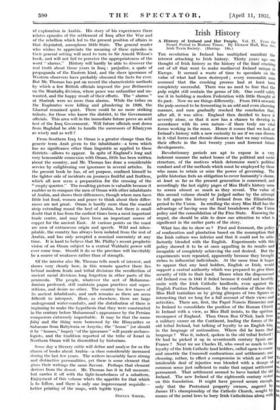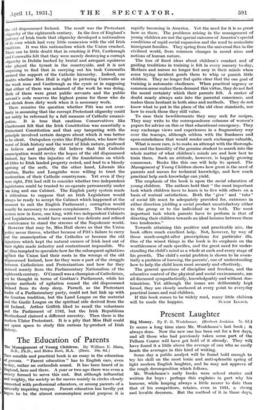Irish History
A History of Ireland and Her People. Vol. II. From the Stuart Period to Modern Times. By Eleanor Hull, Hon. Sec,
Irish Texts Society. (Harrap. 18s.)
THE revolution in Ireland has multiplied manifold the interest attaching to Irish history. Thirty years ago one thought of Irish history as the history of the final crushing out of all that went to make mediaeval Ireland unique in Europe. It seemed a waste of time to speculate on the value of what had been destroyed ; every reasonable man assumed that the crushing process had at least been completely successful. There was no need to fear that the pulp might still contain the germs of life. One could safely use it in building a modern Federation with little thought of its past. Now we see things differently. From 1914 onwards the pulp seemed to be fermenting in an odd and even alarming manner, and men gradually reached the conclusion that, after all, it was alive. England then decided to leave it severely alone, so that it now has a chance to develop in accordance with its own nature—if there truly are vital forces working in the mass. Hence it comes that we look at Ireland's history with a new curiosity to see if we can discern in it vital forces and chronic diseases so that we may estimate their effects in the last twenty years and forecast future developments.
Revolutionary periods are apt to expose in a very indecent manner the naked bones of the political and social structure, of the motives which determine men's political conduct and of the methods which must be employed by those who mean to retain or seize the power of governing. The polite historian feels an obligation to cover humanity's shame, at least so far as the present generation is concerned, and accordingly the last eighty pages of Miss Hull's history seem to screen almost as much as they reveal. The value of this second volume should be judged rather by the attempt to tell again the history of Ireland from the Elizabethan period to the Union. In retelling the story Miss Hull has the advantage of having seen the final breakdown of the Union policy and the consolidation of the Free State. Knowing the sequel, she should be able to draw our attention to what is significant in the earlier parts of the story.
What has she to show us ? First and foremost, the policy of confiscation and plantation based on the assumption that the Irish culture was inferior and that it could not be satis- factorily blended with the English. Experiments with this policy showed it to be at once appalling in its results and incapable of completely achieving the end desired. But the experiments were repeated, apparently because they brought riches to influential individuals. At the same time it began to appear that any land holders, English or Irish, would support a central authority which was prepared to give them security of title to their land. Hence when the dispossessed old Ireland rose in 1641 it failed because it could not heartily unite with the Irish Catholic landlords, even against the English Puritan Parliament. In the confusion of those days Miss Hull tantalizes us by giving glimpses of two figures so interesting that we long for a full account of their views and activities. There are, first, the Papal Nuncio Rinuccini sent to Ireland to consolidate the position of the Roman Church in Ireland with a view, as Miss Hull insists, to the spiritua.
reconquest of England. Then Owen Roe O'Neil, back from a military career on the Continent, leading the forces of the old tribal Ireland, but talking of loyalty to an English kinf in the language of nationalism. Where did he learn that language ? Was it, indeed, spoken in the old tribal Ireland Or had he picked it up in seventeenth century Spain and France ? Next we see Charles II, who owed so much to the loyalty of the Irish Catholic land holders, called upon to cancel and unsettle the Cromwell confiscations and settlements and
choosing, rather, to effect a compromise in which an all but intolerable deal of injustice was blended with a dosage of
common sense just sufficient to make that unjust settlement permanent. That settlement seemed to have buried the old Ireland. The new Ireland of the eighteenth century rested
on this foundation. It might have proved secure enough, only that the Protestant property owners, angered by James H's championship of the Catholic Church, sought by means of the penal laws to bury Irish Catholicism along with
a
a b d
ei
Pt Ii
he tl at of is
nc
hi
the old dispossessed Ireland. The result was the Protestant oligarchy of the eighteenth century. In the face of England's jealousy of Irish trade that oligarchy developed a nationalism of its own which had very little connexion with the old Irish tradition. It was this nationalism which the Union crushed. There can be little doubt that in crushing it Pitt, Castlereagh and Cornwallis felt that they were merely destroying a corrupt oligarchy in Dublin backed by brutal and arrogant squireens who played the tyrant in the countryside, and it is not surprising to find that in carrying out his task Cornwallis, secured the support of the Catholic hierarchy. Indeed, one doubts whether Miss Hull is right in picturing Cornwallis as the weak man and Castlereagh as the cynic or in supposing that either of them was ashamed of the work he was doing. Both of them were great public servants and the public servant's code reserves the highest praise for those who do not shrink from dirty work when it is necessary work.
There remains the question whether Pitt was not over- hasty in assuming that the corrupt Protestant oligarchy could not safely be reformed by a full measure of Catholic emanci- nation. It is true that cautious Conservatives like Charlemont felt that the Irish Constitution was essentially a Protestant Constitution and that any tampering with the principle involved certain dangers about which it was better to be silent. Outspoken cynics like Fitzgibbon, who knew the worst of Irish history and the worst of Irish nature, professed to believe and probably did believe that full Catholic emancipation would revive the hopes of the old dispossessed Ireland, lay bare the injustice of the foundations on which all titles to Irish landed property rested, and lead to a bloody uprising of the serfs. On the other hand, Liberals like Grattan, Burke and Langrishe were willing to trust the moderation of their Catholic countrymen. Yet even if they were right, Pitt had still tO consider whether two independent legislatures could be trusted to co-operate permanently under 9ne king and one Cabinet. The English party system made it ridiculous to suppose that an Irish Legislature would always be ready to accept the Cabinet which happened at the moment to suit the English Parliament ; corruption would usually be necessary to ensure complaisance. The alternative system now in force, one king, with two independent Cabinets and Legislatures, would have seemed too delicate and refined a contrivance to stand the stresses of the Napoleonic world.
However that may be, Miss Hull shows us that the Union policy never throve, whether because of Pitt's failure to carry out the emancipation of the Catholics or because the old injustices which kept the natural owners of Irish land out of their rights made industry and contentment impossible. We ai< thus tempted to speculate how far the subsequent agitations sent the Union had their roots in the wrongs of the old dispossessed Ireland, how far they were a part of the struggle between Catholicism and Protestantism and how far they derived merely from the Parliamentary Nationalism of the eighteenth century. O'Connell was a champion of Catholicism, yet he thought in terms of Grattan's Parliament, while his popular methods of agitation roused the old dispossessed Ireland from its deep sleep. Parnell, as the Protestant leader of a Parliamentary party, could not but link up with the Grattan tradition, but the Land League on the material and the Gaelic League on the spiritual side derived from the old Ireland. Arthur Griffith liked to recall the volunteers and the Parliament of 1782, but the Irish Republican Brotherhood claimed a different ancestry. Then there is the modem Ulster Protestant. It is a pity that Miss Hull could not spare space to study this curious by-product of Irish history.











































 Previous page
Previous page